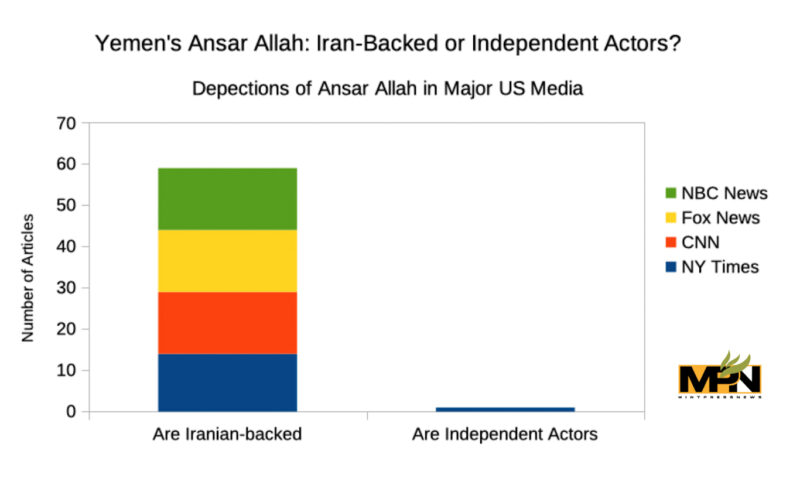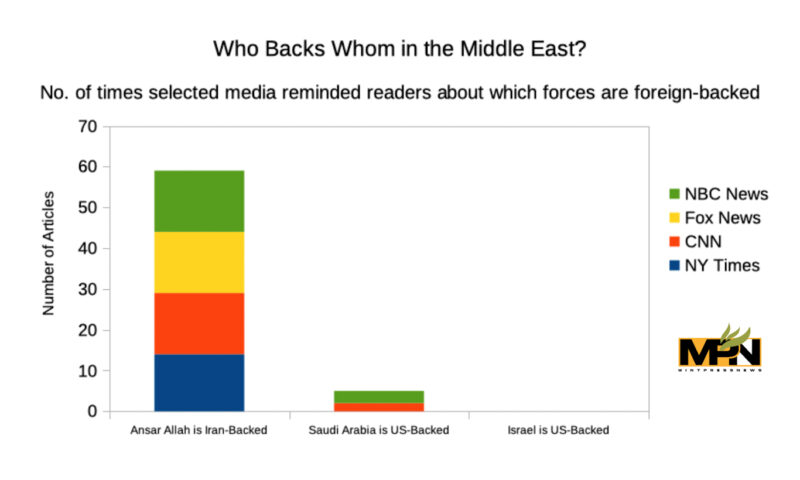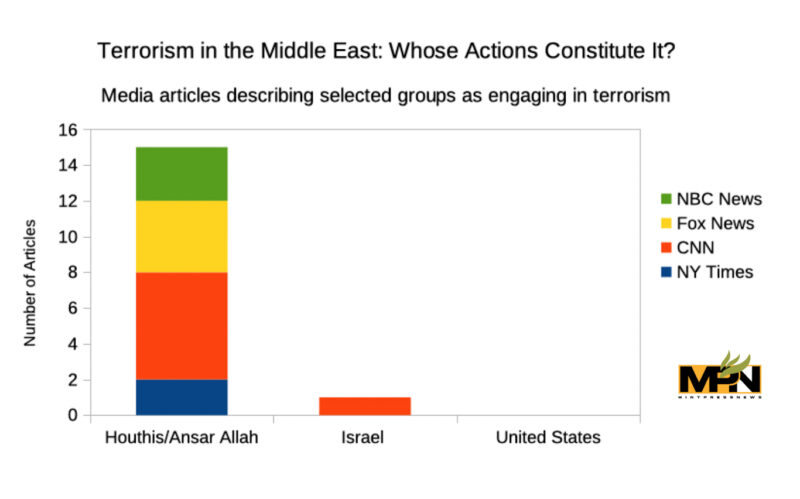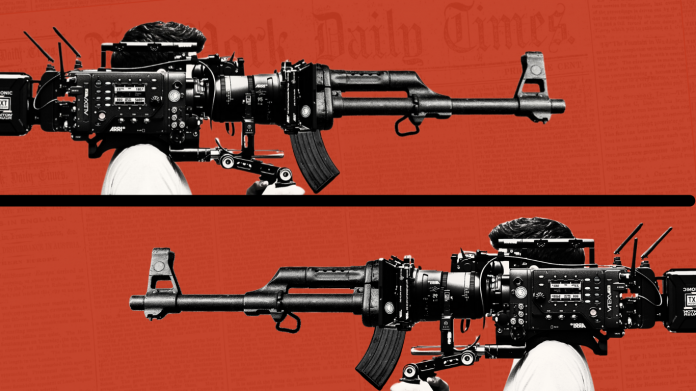A MintPress study of major U.S. media outlets’ coverage of the Yemeni Red Sea blockade has found an overwhelming bias in the press, which presented the event as an aggressive, hostile act of terrorism by Ansar Allah (a.k.a. the Houthis), who were presented as pawns of the Iranian government. While constantly putting forward pro-war talking points, the U.S. was portrayed as a good faith, neutral actor being “dragged” into another Middle Eastern conflict against its will.
Since November, Ansar Allah has been conducting a blockade of Israeli ships entering the Red Sea in an attempt to force Israel to stop its attack on the people of Gaza. The U.S. government, which has refused to act to stop a genocide, sprang into action to prevent damage to private property, leading an international coalition to bomb targets in Yemen.
The effect of the blockade has been substantial. With hundreds of vessels taking the detour around Africa, big businesses like Tesla and Volvo have announced they have suspended European production. Ikea has warned that it is running low on supplies, and the price of a standard shipping container between China and Europe has more than doubled. Ansar Allah, evidently, has been able to target a weak spot of global capitalism.
Western airstrikes on Yemen, however, according to Ansar Allah spokesperson Mohammed al-Bukhaiti, at least, said that they have had only a “very limited” impact so far. Al-Bukhaiti made these comments in a recent interview with MintPress News.
Biased Reporting
MintPress conducted a study of four leading American outlets: The New York Times, CNN, Fox News and NBC News. Together, these outlets often set the agenda for the rest of the media system and could be said to be a reasonable representation of the corporate media spectrum as a whole.
Using the search term “Yemen” in the Dow Jones Factiva global news database, the fifteen most recent relevant articles from each outlet were read and studied, giving a total sample of 60 articles. All articles were published in January 2024 or December 2023.
For full information and coding, see the attached viewable spreadsheet.
The study found the media wildly distorted reality, presenting a skewed picture that aided U.S. imperial ambitions. For one, every article in the study (60 out of 60) used the word “Houthis” rather than “Ansar Allah” to describe the movement which took part in the Yemeni Revolution of 2011 and rose up against the government in 2014, taking control of the capital Sanaa, becoming the new de facto government. Many in Yemen consider the term “Houthi” to be a derogatory term for an umbrella movement of people. As Mohammed Ali al-Houthi, Head of Yemen’s Supreme Revolutionary Committee, told MintPress:
‘Houthis’ is not a name we apply to ourselves. We refuse to be called Houthis. It is not from us. It is a name given to us by our enemies in an attempt to frame the broad masses in Yemeni society that belong to our project.”
Yet only two articles even mentioned the name “Ansar Allah” at all.
Since 2014, Ansar Allah has been in control of the vast majority of Yemen, despite a U.S.-backed Saudi coalition attempting to beat them back and restore the previous administration.
Many of the articles studied, however (22 of the 60 in total), did not present Ansar Allah as a governmental force but rather as a “tribal group” (the New York Times), a “ragtag but effective” rebel organization (CNN), or a “large clan” of “extremists” (NBC News). Fourteen articles went further, using the word “terrorist” in reference to Ansar Allah, usually in the context of the U.S. government or American officials calling them such.
Some, however, used it as a supposedly uncontroversial descriptor. One Fox article, for example, read: “For weeks, the Yemeni terrorist group’s actions have been disrupting maritime traffic, while the U.S. military has been responding with strikes.” And a CNN caption noted that U.S. forces “conducted strikes on 8 Houthi targets in Iranian-backed Houthi terrorist-controlled areas of Yemen on January 22.”
Ansar Allah is responding to an Israeli onslaught that has killed tens of thousands of civilians and displaced around 1.9 million Gazans. Yet Israel and its actions were almost never described as “terrorism,” despite arguably fitting the definition far better than the Yemeni movement. The sole exception to this was a comment from al-Houthi, whom CNN quoted as calling Israel a “terrorist state.” Neither the United States nor its actions were ever described using such language.
Eyes on Iran
Although the perpetrator of the attacks on shipping is unquestionably Ansar Allah, corporate media had another culprit in mind: Iran. Fifty-nine of the 60 articles studied reminded readers that the Yemeni group is supported by the Islamic Republic, thereby directly pointing the finger at Tehran.
It is indeed true that Iran supports Ansar Allah politically and militarily. When directly asked by MintPress if Tehran supplies it with weapons, al-Bukhaiti dodged the question, calling it a “marginal issue.” Why this facet of the story needed to be repeated literally hundreds of times is unclear. Often, the media studied would repeat it ad nauseam, to the point where a reader would be forgiven for thinking Ansar Allah’s official name was the “Iran-backed Houthis.” One CNN round-up used the phrase (or similar) seven times, a Fox News article six times, and an NBC News report five times.
Not only was the “Iran-backed” factoid used constantly, but it was also made a prominent part of how the issue was framed to the American public. The title of one Fox News report, for instance, read (emphasis added throughout): “U.S.-U.K. coalition strike Iran-backed Houthi targets in Yemen after spate of ship attacks in Red Sea,” its subheadline stated that: “Yemen’s Iranian-backed Houthi militants have stepped up attacks on commercial vessels in the Red Sea in recent weeks,” and its first sentence read: “The United States and Britain carried out a series of airstrikes on military locations belonging to Iran-backed Houthis in Yemen early Friday in response to the militant group’s ongoing attacks on vessels traveling through the Red Sea.”

From a stylistic point of view, repeating the same phrase continuously is very poor form. It does, however, drive the point home, suggesting perhaps that this was an inorganic directive from above.
This is far from an unlikely event. We know, for example, that in October, new CNN CEO Mark Thompson sent out a memo to staff instructing them to always use the moniker “Hamas-controlled” when discussing the Gazan Health Ministry and their figures for deaths from Israeli bombardment. This was done with the clear intent to undermine the Palestinian side of the story.
Not only did the four outlets studied constantly remind readers that Ansar Allah is supported by Iran, but they also regularly framed the violence as orchestrated by Tehran and that Ansar Allah is little more than a group of mindless, unthinking pawns of Ayatollah Khamenei. As the New York Times wrote:
Investing in proxy forces — fellow Shiites in Lebanon, Iraq and Yemen, and the Sunni Hamas in the Gaza Strip — allows Iran to cause trouble for its enemies, and to raise the prospect of causing more if attacked…The Houthi movement in Yemen launched an insurgency against the government two decades ago. What was once a ragtag rebel force gained power thanks at least in part to covert military aid from Iran, according to American and Middle Eastern officials and analysts.”
This “Iran is masterfully pulling all the strings” framing was present in 21 of the 60 articles.
The fearmongering about Iran did not stop there, however, with some outlets suggesting Tehran is building an international terror network or constructing an atomic bomb. The New York Times quoted one analyst who said:
Iran is really pushing it…It’s another reason they don’t want a war now: They want their centrifuges to run peacefully.” The Iranians do not have a nuclear weapon but could enrich enough uranium to weapons-grade in a few weeks, from the current 60 percent enrichment to 90 percent, he said. ”They’ve done 95 percent of the work.’”
The point of all this was to demonize Ansar Allah and ramp up tensions with Iran, leading to the inevitable calls for war. “The U.S. needs to strike Iran, and make it smart,” ran the (since changed) title of a Washington Post editorial. “The West may now have no option but to attack Iran,” wrote neoconservative Iran hawk John Bolton in the pages of The Daily Telegraph. Bolton, of course, is part of a group called United Against Nuclear Iran that, since its inception, has been attempting to convince the U.S. to bomb Iran. Earlier this year, MintPress News profiled the shady think tank.
While the media in the sample reminded us literally hundreds of times that Ansar Allah is Iran-backed, similar phrases such as “U.S.-backed Saudi Arabia” or “America-backed Israel” were never used, despite the fact that Washington props both those countries up, with diplomatic, military and economic support. The Biden administration has rushed more than $14 billion in military aid to Israel since October 7, sent a fleet of warships to the region, and blocked diplomatic efforts to stop Israel’s attack on Gaza.
Meanwhile, it is doubtful whether Saudi Arabia would exist in its current form without U.S. support. Militarily alone, the U.S. has sold tens of billions of dollars worth of weaponry to Riyadh, helping the petro-state to convert its oil profits into security. From 2014 to 2023, Saudi Arabia led a U.S.-backed coalition force attempting to remove Ansar Allah from power. This consisted primarily of a massive bombing campaign against civilian targets in Yemen, including farms, hospitals and sanitation infrastructure. The violence turned Yemen into what the United Nations regularly called the “world’s worst humanitarian crisis,” with around 400,000 people dying and tens of millions going hungry and lacking even basic healthcare.

The U.S. backed Saudi Arabia the whole way, selling the government at least $28.4 billion worth of arms, according to a MintPress study. In 2021, the Biden administration announced it would only sell the kingdom “defensive” technology. However, this has included shipments of cruise missiles, attack helicopters, and support for gunships.
Both Saudi Arabia and Israel featured prominently in the articles studied. But only five of the 60 mentioned U.S. support for Saudi Arabia, and none at all for Israel. This context is extremely important for American audiences to know. Without their government’s political, military, economic and diplomatic support, none of this would be possible, and the current situation would be radically different. Only six articles mentioned U.S. support for the Saudi onslaught against Yemen – and none featured the fact prominently as they did with Iranian support for Ansar Allah.
Only one article in the sample suggested that Ansar Allah might not simply be an Iranian cat’s paw. The New York Times wrote that: “The Houthis are an important arm of Iran’s so-called ‘axis of resistance,’ which includes armed groups across the Middle East. But Yemeni analysts say they view the militia as a complex Yemeni group, rather than just an Iranian proxy.” This was the sum total of information given suggesting Ansar Allah is an independent actor.
A Humanitarian Blockade?
Yemen considers its actions in blocking Israeli traffic from the Red Sea as a humanitarian gesture, similar to the “right to protect” concept the U.S. frequently invokes to justify what it sees as humanitarian interventions across the world. As al-Houthi told MintPress:
First, our position is religious and humanitarian, and we see a tremendous injustice. We know the size and severity of these massacres committed against the people of Gaza. We have suffered from American-Saudi-Emirati terrorism in a coalition that has launched a war and imposed a blockade against us that is still ongoing. Therefore, we move from this standpoint and do not want the same crime to be repeated.”
Al-Bukhati said that Ansar Allah did not intend to kill anyone with their actions and that they would stop if Israel ceased its attack on Gaza, telling MintCast host Mnar Adley that:
We affirm to everyone that we only target ships associated with the Zionist entity [Israel], not with the intention of sinking or seizing them, but rather to divert them from their course in order to increase the economic cost on the Zionist entity [Israel] as a pressure tactic to stop the crimes of genocide in Gaza.”
However, this “humanitarian” framing of Yemen’s actions was not prominently used and was only introduced by identifying it as a Houthi claim. Many articles only alluded to the position of Ansar Allah. CNN wrote that “The Iran-backed Houthis have said they won’t stop their attacks on commercial shipping in the Red Sea until the war between Israel and Hamas in Gaza ends.” Meanwhile, NBC News and Fox News frequently presented Ansar Allah’s actions as purely in support of their ally, Hamas, as the following two examples illustrate:

“The Iran-backed militants, who say their actions are aimed at supporting Hamas, vowed retaliation and said the attacks had killed at least 5 fighters at multiple rebel-held sites” (NBC News).
“Houthi forces have taken credit for continued attacks on merchant vessels and threatened to expand their targets to include U.S. and British vessels — all in a campaign to support Hamas in its war against Israel” (Fox News).
Therefore, humanitarian action was refashioned into support for terrorism.
Other articles also suggested a wide range of reasons for the blockade, including to “expand a regional war” and “distract the [Yemeni] public” from their “failing…governance” (New York Times), to “attempt to gain legitimacy at home,” (CNN), and “revenge against the U.S. for supporting Saudi Arabia,” (NBC News). Many offered no explanation for the blockade whatsoever.
A War “Nobody Wants”
As al-Bukhaiti’s comments suggest, there would be a very easy way to end the blockade: get Israel to end its operations in Gaza. But only twice in 60 articles was this reality even mentioned; one noting that Omani and Qatari officials advised that “reaching a cease-fire in Gaza would remove the Houthis’ stated impetus for the attacks,” and once in the final sentence of an NBC News article quoting al-Bukhaiti himself saying exactly as much. However, due to the placement of the information and the fact that it came from an organization regularly described as an Iran-backed extremist terrorist group, that idea likely held little weight with readers. Instead, military solutions (i.e., bombing Yemen) were the overwhelming response offered by the corporate press in their reporting.
Despite this, the media consistently presented the United States as a neutral and honest actor in the Middle East, on the verge of being “sucked” into another war against its will. As the New York Times wrote, “President Biden and his aides have struggled to keep the war contained, fearful that a regional escalation could quickly draw in American forces.” There was a profound “reluctance,” the Times told readers, from Biden to strike Yemen, but he had been left with “no real choice” but to do so.
This framing follows the classic trope of the bumbling empire “stumbling” into war that media watchdog Fairness and Accuracy in Reporting has documented, where the United States is always “responding” to crises and is never the aggressor. “How America Could Stumble Into War With Iran,” wrote The Atlantic; “Trump could easily get us sucked into Afghanistan again,” Slate worried; “What It Would Take to Pull the US Into a War in Asia,” Quartz told readers.
None of the journalists writing about the U.S.’ frequent misfortune with war ever seem to contemplate why China, Brazil, Indonesia, or any other similarly large country do not get pulled into wars of their own volition as the United States does.
The four media outlets studied regularly presented the U.S. bombing one of the world’s poorest countries as a method of defending itself. CNN wrote that “Administration officials have repeatedly said that they see these actions as defensive rather than escalatory,” without comment. And Fox News ran with the extraordinary headline, “U.S. carries out ‘self-defense’ strike in Yemen against Iran-backed Houthi missiles” – a framing which could surely only fly in a deeply propagandized nation.
In reality, the United States’ military meddling in Yemen did not start this winter. Biden is the fourth successive U.S. president to bomb the country. In December, the White House confirmed that there are already American troops in Yemen, though what their precise focus is remains unclear.
How Propaganda Works
This sort of wildly skewed coverage does not happen by accident. Rather, it is the outcome of structural and ideological factors inherent within corporate media. The New York Times is committed to Zionism as an ideology, and its writers on the Middle East are not neutral actors but protagonists in the ongoing displacement of Palestinians. The newspaper owns property in West Jerusalem that was seized from the family of writer Ghada Kharmi during the 1948 ethnic cleansing. And while many Times writers are openly supportive of the Israeli project and have family members serving in the Israeli Defense Forces, staff who speak out against the ongoing genocide are promptly shown the door.
Fox News is no less complicit in the Israeli project. Its owner, Rupert Murdoch, is a major owner in Genie Energy, a company profiting from oil drilling in the illegally occupied Golan Heights region. Murdoch is famously hands-on as a boss and makes sure all of his media outlets follow his line on major issues. And on Israel, the Australian billionaire is explicit: “Israel is the greatest ally of democracy in a region beset with turmoil and radicalism,” he said in 2013. The network’s massive Evangelical Christian viewership would expect little else than strong support for the U.S.-Israeli position, either.
CNN, meanwhile, operates a strict, censorious, top-down approach to its Middle East coverage, with everything the outlet prints having to go through its notoriously pro-Israel Jerusalem bureau before publishing. Senior executives send out directives instructing staff to make sure that Hamas (not Israel) is always presented as responsible for the current violence while, at the same time, barring any reporting of Hamas’ viewpoint, which its senior director of news standards and practices told staff was “not newsworthy” and amounted to “inflammatory rhetoric and propaganda.”
Therefore, the results of this study, while shocking, should not be surprising, given this context. Through examining the coverage of Yemen in four leading U.S. outlets, it is clear that corporate media are failing to inform the public of many of the basic realities of who Ansar Allah is, why they are carrying out their campaign, and what it would take to end the hostilities, they are perpetuating this war, and therefore are every bit as responsible as the politicians and military commanders who keep the bloodshed going.
Feature photo | Illustration by MintPress News
Alan MacLeod is Senior Staff Writer for MintPress News. After completing his PhD in 2017 he published two books: Bad News From Venezuela: Twenty Years of Fake News and Misreporting and Propaganda in the Information Age: Still Manufacturing Consent, as well as a number of academic articles. He has also contributed to FAIR.org, The Guardian, Salon, The Grayzone, Jacobin Magazine, and Common Dreams.
The post Study Finds Media Giants New York Times, CNN, and Fox News Pushing for US War in Yemen appeared first on MintPress News.
